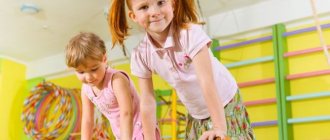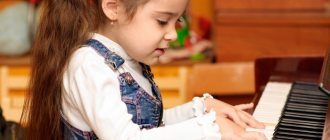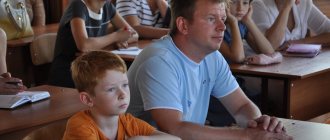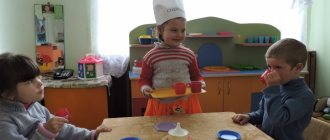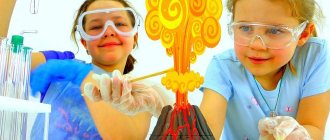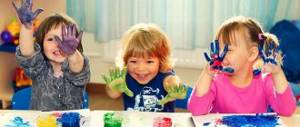What mistakes can parents make when developing their child’s speech?
Often the child is overly patronized and protected, they try to predict his desires - of course, out of love for him.
But then the baby does not develop the desire to work independently, he does not learn to express his thoughts through speech, and many processes in his development may be inhibited. • Intuition and love help loved ones understand a child literally at a glance. But communicating with unfamiliar people in unusual conditions will be difficult for him, and in the worst case, acutely uncomfortable. To prevent this from happening, as you grow older, you need to enter into conversations more often with new and new interlocutors, and then the child will simply be forced to improve his speech understanding skills.
• Some parents underestimate, while others overestimate, the requirements for the baby’s speech. In the first case, they do not demand anything from the child, all his wishes are guessed and immediately fulfilled, in the second, they constantly pester him: “Tell me!”, “Repeat!”. Sometimes in one family two extreme approaches are used at once: for example, dad demands, and grandmother takes care. This has a very adverse effect on the child’s speech development.
• Try to eliminate lisping, “baby talk,” and constant onomatopoeia when communicating with your baby. The parent's speech is a model for the child.
• Parents can speak very quickly or, conversely, too slowly, without pauses and different intonations, monotonously. It is important to use all the richness and diversity of language when developing a child’s speech.
• Do not try to speed up the baby's natural speech development. Avoid overwork from speech classes and memorization of poetry.
“How to develop the speech of younger preschoolers?” consultation
Consultation for kindergarten parents
“How to develop the speech of younger preschoolers?”
In the development of a child’s speech, the leading role is played by adults: the family (parents) and the kindergarten teacher. The child’s success in mastering the language depends on the culture of speech of adults and how they talk to the child, how much time they devote to verbal communication.
Thus, an adult’s speech must comply with the norms of literary language and literary colloquial speech both in terms of the sound aspect (diction, tempo, pronunciation of sounds and words) and in terms of the richness of the vocabulary, accuracy of word use, grammatical correctness and coherence.
Also of great importance for the development of a child’s speech is the living environment in which he is brought up, the attitude of surrounding adults, care, educational influences and the child’s own activity in various activities.
In the first three years of life, speech is formed in the process of life activity - in routine moments, in independent play, in the process of direct educational activities.
The adult’s attitude towards the child’s development is important for the timely development of speech. An attentive, careful and friendly attitude ensures the development of reciprocal positive emotions and various reactions of the child. Without this, it is impossible to establish close contact with the baby and develop his speech.
At a young age, communication is the main form of educational influence on children. Communication is the relationship between an adult and a child, which includes the adult’s address to the child and the child’s response to the adult.
The third year of life is the main period in the development of a child’s speech. Development tasks are varied. It is necessary to teach children to understand the speech of others without visual accompaniment, to form a grammatical structure of speech, to develop verbal communication with adults and peers, and to expand their active vocabulary.
Speech development occurs at specially organized events in kindergarten, during which actions with objects and movements develop. And also development should occur in everyday life (regular moments, independent activities). In the process of observing living objects, it is necessary to familiarize children with their appearance, habits, how and what they eat. After this, it is necessary to have a conversation with the child about what he heard, saw, using leading questions, activating the communicative function. In the process of observations, one should also not only state what is happening, but also develop children’s thinking abilities: teach them to compare objects and establish similarities and differences between them.
The child’s communication with adults and with other children contributes to the fact that he learns more complex forms of communication, not only asks or helps, but also correlates his actions with the actions of others.
It is necessary to carefully monitor the child’s speech: listen to how he speaks and repeat with him all the words and phrases, because when repeating, we confirm the correctness of the spoken words, and, if necessary, provide the correct examples for assimilation. This technique is important for practicing correct sound pronunciation and use of grammatical forms.
Also important are the techniques of finishing (nursery rhymes, poems) and suggesting the right word (a child, while retelling or reading by heart, may have difficulty using a certain word, it is necessary to help him in time).
Educational games for children three and four years old, aimed at developing correct and competent speech in children. Games enrich a child’s vocabulary, activate his speech, and form visual, figurative and conceptual thinking.
To develop children's speech activity, pictures depicting objects in action, separately located objects, and plot pictures are widely used. This increases interest in what is depicted, helps develop various mental operations and generalize knowledge. As a result, the child develops the ability not only to repeat words after adults, but also to independently express his opinions.
We teach storytelling: we teach how to coherently tell familiar fairy tales and consistently present the events in them. Other works can be narrated similarly. And if a child begins to imitate the voices of animals from a fairy tale, that’s wonderful! It will be a one-man show. Or you can role-play the fairy tale, it will be even better.
In the absence of systematic activity, contact between children and adults is practically not established.
Skillful use of all of these techniques will contribute to the timely development of your children’s speech.
When to see a speech therapist
You should contact a speech therapist if:
• up to 2.5 years the child has not developed speech or the child’s vocabulary is no more than 10 words. A qualified speech therapist can not only correct sound pronunciation, but also stimulate the appearance of speech in non-speaking children;
• a child of 1.5 - 2.5 years old does not utter normal, understandable words like “mother”, “woman”, “bi-bi”, “cat”, “drink”, “go”, but speaks in his own language language, and a lot and actively (no need to wait 3 years - go to a speech therapist right now);
• a child of 4 – 5 years old softens all sounds: “kisya”, “shchapka”, “taynik”, “lampotka”;
• a child 3 years of age and older distorts the syllabic structure of a word, skips, rearranges syllables, adds new ones: “puvitsa” - “button”, “gebimot” - “hippopotamus”, “pepitan” - “captain”;
• the child is over 6 years old and does not pronounce any sounds of his native language. At this time, the phonetic system is fully formed, and the baby should speak correctly;
• the child began to repeat the first sounds, syllables, words (speech hesitations appeared).
You should also be more careful if your child is learning several foreign languages at once: sometimes in such cases he may develop dysgraphia, a disorder in mastering written language. To avoid deviations, you need to work with your child as soon as he becomes familiar with letters - usually this skill comes at 4 - 6 years old.
Consultation for parents “Speech development of children of primary preschool age”
Naida Aleskerova
Consultation for parents “Speech development of children of primary preschool age”
Early childhood group Consultation for parents
«Speech development in preschool children»
MDOU "Kindergarten No. 152"
Educator: Aleskerova N.Z.
2019 SCHOOL YEAR
«Speech development in children and early preschool age»
The upbringing and education of children of early and preschool age is comprehensive . This means creating optimal conditions for the simultaneous development of speech , thinking, memory and other cognitive processes. The development of verbal communication occurs not only in specially organized classes, but also during games of drawing, modeling, design and other types of children's activities. The development of communication is also facilitated by the interaction of children with each other . Through speech, an adult introduces children to the world around them, teaches play actions, and develops certain behavioral skills.
The formation of a child’s own active speech presupposes his mastery of the lexical and grammatical side of speech and the development of forms and functions of speech . children's vocabulary is carried out through words denoting objects, actions, and signs.
Simultaneously with the expansion of the dictionary, work is carried out to develop an understanding of the meanings of words: the child begins to understand that each object, action, sign has its own name. He also begins to isolate and understand the endings of words that convey grammatical meaning, etc.
Specific work with young children is aimed at activating their vocabulary and mastering phrasal speech. According to the sound-syllable structure, the vocabulary is activated in the following order: words from repeated syllables such as la-la, uncle, tata, nana, and etc.; onomatopoeia: af-af, bi-bi, etc.; two-syllable words with open syllables such as vata, Vova, Nina, water. goat, etc.; three-syllable words with open syllables; milk, dog, walked, etc.
Mastering phrasal speech occurs in stages. First, children learn to make a request ( “Give me this”
;
“Auntie, give me this,”
then with a proposal for cooperation (“Let’s play”) and, finally, with a message (
“Bear. The bear is crying”
) and a question (
“Where is Lala”
).
Techniques for teaching preschool children
The main methods of teaching, as well as the content of training, are determined by the thinking characteristics of young children , which is visually effective and visually figurative in nature.
The development of children's speech occurs in the process of familiarizing them with objects and phenomena of the surrounding world. Considering the above, the characteristic methodological techniques for teaching young children include the following:
- display of an object (toy)
and its name;
- examination of the subject;
— display of actions with objects and their names;
— display of pictures depicting individual objects;
When developing the ability to listen to the speech of an adult , you should actively encourage the child to respond not only with movements, but also with words and speech.
It is recommended to use the following games and exercises:
Games with pyramids
Ball games with balls
Selection of paired pictures
Breathing and voice exercises
Development of fine motor skills
Tasks for the development of speech in young children :
1. teach children to use subordinate clauses like; to drink, to listen, to watch, answers to an adult’s questions that begin with the words: “Why do you need (mouth, ears, eyes?”) Please note: not the entire complex sentence, but only part of it, must be given by the child in response.
2. teach children to use words in full and diminutive form: bunny, bunny, bear, bear, etc. In order to get different answers to the same question, encourages children with such appeals : “What can you call a hare (bear) etc.)
kindly?"
3. activate the simplest phrases from fairy tales in children’s speech during their performances: “I am a wolf”
-
“I am a fox”
-
“Come live with us”
(Russian folk tale
“Teremok”
)
4. teach children to voluntarily memorize short poems and nursery rhymes.
5. As children get acquainted with their group , with the premises of the kindergarten, they develop orientation in the environment: understanding the location of objects in space relative to each other within the group room, assimilation of their names and, as they are assimilated, use for communicative purposes (on the window, on the table, on a shelf, in a closet, etc.
Introducing children to fiction
A special technique for developing children’s speech will be familiarization with fiction.
Literary works have a great influence on the development of children . In kindergartens, children are read fairy tales and stories, talk with them about what they have read, teach them to retell, etc. In this case, works of folklore (oral folk art)
: proverbs, sayings, nursery rhymes, riddles, fairy tales.
The development of speech also occurs during the labor visual activity of games:
— Role-playing
— Didactic
-Movable
Learning outcomes
As a result of training, children acquire the following verbal communication skills:
- consciously perceive the speech of adults (listen to the speech of others)
-understand and be able to use grammatical forms of singular and plural (one-many)
;
- be able to actively use a dictionary from the topics covered, transferring suitable words from one topic to another;
-ask simple questions: who (what)
This? Where were you? Where did you go?;
-memorize and recite with the help of a speech therapist simple nursery rhymes, short rhymes accompanied by movements ( “Magpie-Crow”
,
“Okay”
,
“Pussy”
, etc.);
-include answers with subordinate clauses.
By the end of the first year of study, children should master the following skills and abilities:
freely use situational speech when communicating with each other and with adults during joint activities (in a game, on a walk, and in other everyday situations)
;
initiate communication with adults and peers;
remember and tell fairy tales, nursery rhymes, poems, taking part in joint speech activities with adults (the adult begins - the child adds a word or phrase in a familiar text).
The most important achievements of a child during the school year should be considered the following: the accumulation of certain speech means and mastery of the ability to use them in communication with others, the assimilation of lexical and some grammatical meanings of words and their correct use in an organizational learning situation and outside it, the mastery of some simple sentence structures in motivational and narrative form.
